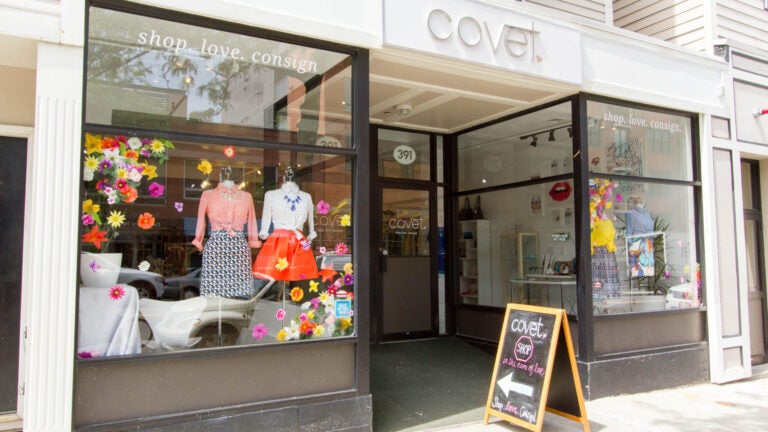How to sell your clothes at a local consignment shop
That dress you wore to your cousin's wedding can put cash in your pocket.

For an essential guide to the city, sign up for How to Boston, Boston.com’s weekly culture and lifestyle newsletter.
Do you have a closet full of clothes that you no longer wear? Could you use some extra money? If you answered “yes” and “definitely yes” to those questions, you may want to consider heading to a consignment shop to recycle your threads and get a cut of the profit.
Hanadi Hamzeh is owner of South Boston’s Covet, a women’s consignment store she opened in 2013. Consignment shopping in Boston has “grown tremendously” over the last few years, according to Hamzeh, who has been in the industry for eight and said she tripled the size of her store last year to accommodate the demand.
“I think people like the idea of being green,” she said. “I think they like the thrill of the hunt. In a consignment shop, you never know what you’re going to find. That’s what makes shopping fun.”
Hamzeh said she thinks social media also has helped fuel the popularity of consignment in recent years.
“A girl will wear a dress once, and now that it’s on her Instagram page, she probably won’t wear it again because everyone has seen it,” Hamzeh said. “So girls just kind of go through clothes much faster.”
She offers thousands of items in her 1,300-square-foot store, everything from “adorable little tops” from Forever 21 and H&M for $10 to a Gucci tote currently priced at $500 (and valued at $1,400). The women who consign and shop at her store range in age from 20 to 70, she said.
“Girls can come in and bring in five items and just make between 30 and 50 dollars,” Hamzeh said. “We also have women who consign their whole wardrobe, literally, and bring in hundreds of items and accrue thousands of dollars.”
Hamzeh offered the following tips for making money on your clothes.
Check your calendar
Consignment shops sell clothes that are currently in season, Hamzeh said, so forget trying to cash in on items like coats and boots in July.
“Right now we’re in summer, and we’re only taking summer clothes,” Hamzeh said. “So we wouldn’t take anything that’s overly heavy. In August, we’ll start taking less shorts, less maxi dresses, and start taking more long sleeves, more light jackets and blazers, more jeans and ankle booties.”
Know it’s not always all about the brand
Check with the shop before taking in your items, Hamzeh said, but if you think all consignment shops will only take top designers, think again. Covet, for example, goes for everything from H&M to Hermès.
“We take all brands,” Hamzeh said. “The reason for that is, that’s what shoppers, generally speaking, are looking for. I usually tell my consignors, ‘Think about what you would want to buy.’ You would want to buy the cool, fun item more so than because it’s a brand. We’re more concerned with style than with brand. Brand is important, because shoppers are brand loyal, but we don’t want anyone to not bring anything in because it’s not a certain label.”
As Hamzeh put it, “When in doubt, bring it in. The worst we can say is, ‘No, thank you.'”

Inside Covet in South Boston.
Make sure the items ‘have a lot of life left’
If the clothes you want to sell look overly worn, are pilling, have runs or stains of any kind, broken zippers or buttons, or are missing sequins, they aren’t good candidates for consignment, Hamzeh said.
“Anything that’s not in great condition, that should be donated,” she said. “That’s not something that most consignment shops would take. It should be in great condition.”
Get familiar with the feel of the consignment shop
However, keep in mind that even if an item is in fantastic condition, the store reserves the right to refuse it, Hamzeh said.
“Just because we don’t take something, it doesn’t mean it’s not a great item,” she said. “What we take and don’t take doesn’t necessarily reflect on the clothes; it’s what our customers want to buy.”
There are a lot of young professionals in South Boston who shop at her store, so Hamzeh keeps that in mind when choosing the clothes she’ll accept, she said.
“Our average item we sell is $25; that’s our average selling price,” she said. “It’s more on the affordable side, which is what consignment is. Most girls are just trying to find a fun dress for a Saturday night dinner or a cool shirt for work.”
Learn the store’s policies
Some consignment stores require that you make an appointment to drop off clothes to sell, while others allow walk-ins (Covet does for 15 items or fewer), so it’s a good idea to call ahead to learn the policy of the store.
As a consignor, you’ll often have to fill out a contract that lists in detail the whole consigning process, so be sure you know what you’re signing. At Covet, consignors learn that the shop prices each item at around 20 to 30 percent of retail and that items must sell within 60 days. If an item isn’t selling, the store may discount it further within that 60-day period. At the end of the 60 days, Covet gives consignors a pick-up date to retrieve unsold items. If items are not picked up by that date, they become Covet’s property and are donated.
You also should make sure you understand your consignment store’s policy when it comes to getting paid. At Covet, consignors earn between 40 and 60 percent of the sale of the item, Hamzeh said. The percentage varies depending on the item. Consignors can retrieve their earnings at any time after the sale of the item and also receive a discount if they decide to buy items from the store.







